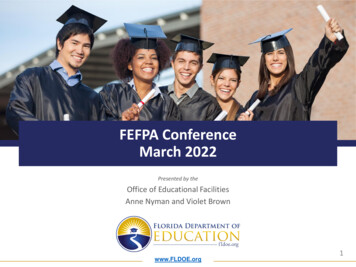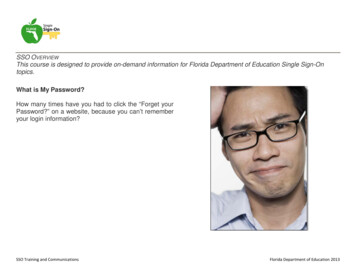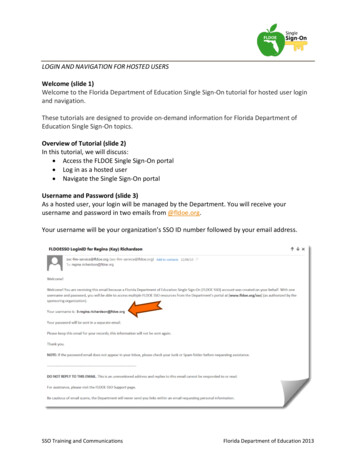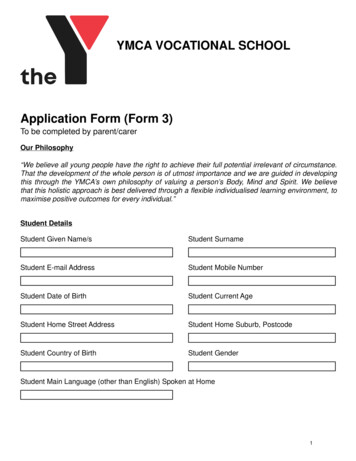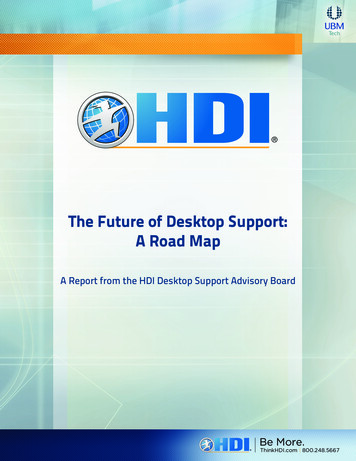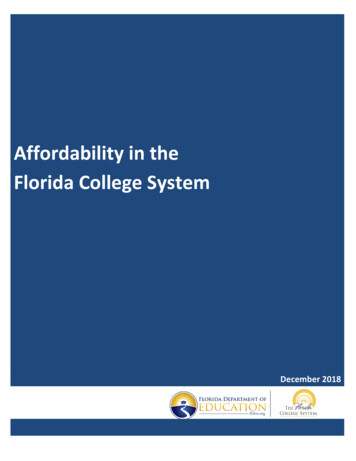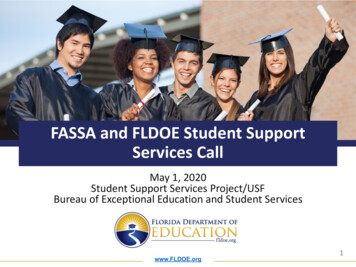
Transcription
FASSA and FLDOE Student SupportServices CallMay 1, 2020Student Support Services Project/USFBureau of Exceptional Education and Student Serviceswww.FLDOE.org1
Mental and Emotional Health Instruction Can we get clarification on the reporting requirements for the threerules of Mental Health instruction, child trafficking, and substanceuse and abuse? The guidance provided on April 14th, 2020 stated thefollowing requirements are still a priority for the Florida Departmentof Education and districts should make every effort to provide therequired instruction and reporting: 5 hours mental and emotional health education, grades 6-12 (6A1.094121). Child trafficking prevention education, grades K-12 (6A-1.094123). Substance use and abuse prevention education, grades K-12 (6A1.094122). Annual reports, in addition to the required instruction pers. 1003.42(2), Florida Statute are due by July 1.www.FLDOE.org2
Mental Health and Crisis Response Regarding Suicide Risk Assessment, what does our certificationallow us to do for students who are not on campus that arerequiring immediate assistance? Your current plan can be adapted to fit the virtual setting. If a concern is raised, and the student is not in imminent dangera student services staff should be contacted to conduct a suicide riskassessment. If a student is at “Elevated” or at “Serious Risk” how should weproceed as the student is not on our school campus and is athome? How do we ensure the safety of the student in crisis? If danger is imminent, contact local law enforcement. When possible, involve adult that is home with the student.www.FLDOE.org3
Counseling as a Related Service Most webinars and guidance address the need for consentfor telehealth but if it is Tier 3 is this still required orrecommended? Under ESSA, a State, local educational agency, or other entityreceiving funds under this title shall obtain prior written,informed consent from the parent of each child who is under18 years of age to participate in any mental-healthassessment or service. Should consult with your generalcounsel for locally determined. How are other districts communicating disclosure issues relatedto use of Zoom or other virtual platform with parents? Districts-please share what you are doing in the chat boxwww.FLDOE.org4
Sharing of Confidential Information Are there any statutes, policies, guidance documents that canbe shared to support the electronic sharing of confidentialinformation (e.g., psych/social work reports) in the mostsecure manner? FERPA is a privacy rule and does not include explicitinformation on security standards. School districts should work with their informationsecurity officers and attorneys to review informationsecurity requirements and terms of service. For more information please see the guidance from the USDepartment of Education (USDOE) from March pdf.www.FLDOE.org5
Referral and Consent Issues Should referrals for initial evaluations be generated at thistime? Decisions about initial evaluations should be made on an individualcase basis and in consultation/agreement with parents. OSERS/OCR Supplemental Fact Sheet Is it appropriate to obtain consent for a comprehensiveevaluation via mail or email? District-determined decision and made in agreement with parent(consult with school board attorney). Consider secure ways of obtaining consent (Docusign, passwordprotected, certified mail, etc.) or verbal consent documenting dateparent provided verbal consent. Be clear about what components of a full, and individual evaluationwill be conducted during distance learning.www.FLDOE.org6
60-day evaluation timeline Will districts be accountable for 60-day evaluation timeline? No waiver to the 60-day evaluation timeline. To the extent practical, continue to conduct requiredevaluations and reevaluations virtually or by phone. For evaluations that are postponed and extend beyondthe evaluation timeline, document the reason for thedelay and communication with parent, and establish aplan to complete expeditiously when students return. FDOE Q & A Guidance (March 19th) If SLD is the suspected disability, consider extension bymutual agreement.www.FLDOE.org7
Face-to-face evaluations What is the FDOE guidance on face-to-face evaluations? If an evaluation requires a face-to-face assessment orobservation, the evaluation would need to be delayeduntil school reopens (OCR Fact Sheet, March 16th). Evaluations and re-evaluations that do not require faceto-face assessments or observations may take placewhile schools are closed, so long as a student’s parent orlegal guardian consents (OCR Fact Sheet, March 16th). If face-to face evaluation procedures are not feasible,this should not delay completion of components thatcan be conducted remotely (FDOE Q&A, March 19th). District responsible for considering the health, safety,and well-being of students and staff (OSERS/OCRSupplemental Fact Sheet).www.FLDOE.org8
Remote/Virtual Assessments Under certain conditions evaluators may have greaterflexibility in conducting evaluations remotely. Decision to administer assessments in a nontraditionalmanner should be made on an individual-case basis takinginto account a number of factors, including: Availability of appropriate technology;Competency and training of the evaluator;Impact on the examinee’s test performance;Ethical and contextual considerations Unless the assessment was standardized in a telepracticemode, this must be considered when interpreting theassessment results.www.FLDOE.org9
Developmental Delays What will happen if the reevaluation of a student currentlyidentified as Developmentally Delayed (DD) cannot becompleted prior to the student’s 6th birthday? Document attempts to evaluate and communication withparents. The student would be dismissed and receive tiered supportsand monitoring commensurate with their level of need. What about extension of DD beyond age 6? Are other counties completing evaluations for students whothe evaluator has never met, and if so, how? Districts-please share what you are doing in the chat boxwww.FLDOE.org10
504 meetings What is the district's responsibility for holding 504meetings? To the extent feasible and with parent agreement holdmeetings virtually. More flexibility with Section 504 than IDEA. Continue to provide services on 504 plan. Review when student returns to school.Ensure that students with a 504 plan have accessto virtual instruction and distance learning!www.FLDOE.org11
School Health Is there any guidance related to personal protection equipment(PPE) for clinic staff when they return? Should the district expectto provide PPE? Technical assistance/guidance below has been provided bythe National Association of School Nurses (NASN) thatincludes Facemask considerations for Healthcare Professionals inSchools Interim guidance from CDC Guidance to school nurses seeking facemask protectionin their schools Collaboration with school administrators and local healthdepartmentsThe guidance can be found atNASN opics/covid1912www.FLDOE.org
Medicaid Guidance related to Medicaid from federal andstate Medicaid agencies on SSS website at http://sss.usf.edu/covid19/index.html Guidance includes, among other items: Telemedicine requirements for services that will be billedto Medicaid USDOE-FERPA and coronavirus frequently asked questions HIPAA-FERPA joint guidance from Health and HumanServices and USDOE Centers for Medicare and Medicaid Services FAQ Health and Human Services - Notification of enforcement discretionfor telehealth remote communications during the Covid-19 publichealth emergencywww.FLDOE.org13
Resources Parent/Caregiver Guide to Helping Families Cope With theCoronavirus Disease 2019 (COVID-19) Helping Children Cope with Changes Resulting from COVID19 Virtual Service Delivery in Response to COVID-19Disruptions Talking with children about Coronavirus Disease 2019 School Psychologists Providing Telehealth Services The School Counselor and Virtual Counseling Planning for Virtual/Distance School Counseling During anEmergency Shutdown Student Support Services COVID-19 Resourceswww.FLDOE.org14
Project ContactsStudent Support Services Project325 W. Gaines Street, Suite 644Tallahassee, FL 32399Andrew WeatherillProject DirectorAndrew.Weatherill@fldoe.orgDr. José CastilloPrincipal uCurtis JenkinsSchool Counseling ConsultantCurtis.Jenkins@fldoe.orgIris WilliamsSchool Social Work ConsultantIris.Williams@fldoe.orgJan OberschlakeProgram Analyst, PEERJan.Oberschlake@fldoe.orgFelicia TrumplerSchool Counseling ConsultantFelicia.Trumpler@fldoe.orgAnne GlassMedicaid ConsultantAnne.Glass@fldoe.orgThomas GarrettProgram Analyst, PEER/MTSThomas.Garrett@fldoe.orgDr. David WheelerSchool Psychology ConsultantDavid.Wheeler@fldoe.orgNanci EnglishEMACS/Medicaid CoordinatorNanci.English@fldoe.orgTBDSchool Nurse Consultant15
Is it appropriate to have student PSmeetings at this time? Yes!Considerations: How were student PS meetingsconducted before distancelearning? What can transfer? Team members Involvement of/support toparents (especially if no/limitedaccess to internet) Time/Platform/Phone Available or needed dataRecommendations: Use virtual meeting softwarewith screen share capabilities Establish clear norms &roles/responsibilities Facilitator Notetaker Timekeeper Identify likely available datapre/post school closures Facilitate team members’ accessto student data/info prior tomeeting#flpsrti
Guidance re: students receivingTier 2 and Tier 3 supportConsiderations: What was being provided prior todistance learning? Tier 1? Tier 2? Tier 3?Recommendations &Resources: Recommendations What can feasibly be providednow for small group and intensiveinstruction? Solid Tier 1 is foundational—evenin distance learningTier 2 and 3 should build upon Tier1 distance learning instruction(more time, narrowed focus,smaller groups) Who/what/when/how Progress monitoring Ensure building off solid Tier 1Utilize modules in learningmanagement systems & virtualmeeting software to augment Tier 1instructionOnline/web-based interventionprograms can work, but be careful Resources Tiered instruction in a distancelearning environment doc availablesoonFacilitated Conversations webinarsMay Statewide webinar: RebeccaMead/JRF#flpsrti
How is MTSS addressed inVirtual WorldConsiderationsRecommendations Leadership Define and focus on Tier 1 Communication/Collaboratio Problem-solve barriers ton Problem Solving Tiered Support Infrastructure Data EvaluationThinking outside the (brick andmortar) box!access “Attendance” Engagement Identify intervention andprogress monitoringresources for Tier 2 and 3supports Provide guidance andsupport It won’t be perfect, andthat’s OK!#flpsrti
Guidance re: Data Points/EligibilityDetermination“How” Considerations: What data are available from beforeMarch 2020? Making best decisions possible withdata you have Balance: compliance with good faitheffort Remember Lack of access/opportunity is not a disabilityBUT, we have a responsibility toevaluate if we suspect a disability COMMUNICATION DOCUMENTATIONRecommendations Pull-in data from Tier 1, 2, & 3supports already collected (this is nodifferent than before) Determine what is a reasonableamount of time for growth to bedemonstrated Identify which data sources can beaccessed reliably via distance Have important discussions re: Rule-outs Quality of data/demonstrated RTI Impact of instructional environment Other#flpsrti
District Share OutPinellasFlaglerPascoBrevardwww.FLDOE.org20
District Share OutPinellaswww.FLDOE.org21
Student Services in aDigital Learning LandscapePinellas County Schools
Attendance & Engagement Suicide Prevention Threat Assessment Counseling
Attendance & Engagement Child Study Team School-Based Engagement Strategies Attendance Indicators
Suicide Prevention Familiar District Contact Increased Community Support Sandy Hook Anonymous ReportingSystem
Threat Assessment School-Based Team District-Based Team
Counseling Service to Students as Priority Medicaid Billing Requirements Parent Notification for GroupCounseling
Coping with Covid-19 ThroughConnections YouTube videos for Primary &Secondary Developed my Multi-Disciplinary StudentServices Team Common Content Available to allSchools
District Share OutFlaglerwww.FLDOE.org29
FLAGLER COUNTY SCHOOL DISTRICTMH Outreach & Services
PARENT ASSISTANCE & SUPPORTSESSIONS (PASS) & “POWER HOURS” Each school psychologist is hosting a weekly one-hour Zoom meeting forparents. Some psychologists are hosting solo, while others are hosting alongwith members of the school’s mental health team, i.e. school counselors,contracted MH counselors, behavior specialists, etc. Sessions take place from 5:00pm-6:00pm and require preregistration. Parentsinclude their concerns on their registrations, so we can be prepared withresponses to their specific questions and concerns. Questions and concerns can be related to student and/or parent MH issues.Topics include, but are not limited to: stress, anxiety, depression, anger,frustration, confusion, lack of motivation, etc. First session is hosted by each school, but subsequent sessions will probablybe grouped by level, i.e. elementary, middle, and high. Information was shared via SIS emails to parents, posting on school websitesand social media pages, displayed on school marquees, etc.Flagler County School District
OFFICE HOURS/TELECOUNSELING/CHECK-INS Each psychologist has set up “office hours” on our calendars, during whichwe are available for individual appointments, phone calls, or Zoom sessions. We have each obtained a Google Voice number that rings to our personalcell phones to give students & parents the ability to contact us withouthaving to give out our personal numbers. Teachers have been provided with our schedules, Google Voice numbers,and links to our calendars for appointment scheduling, to share with theirparents and students. Our info has also been posted to Schoology folders(Flagler’s virtual learning platform). IEP Counseling students are provided their counseling via Zoom sessions perthe schedule specified on their IEP’s. Check-in/Check-out students receive virtual services via Zoom on theschedule they were receiving them prior to the closure of school.Flagler County School District
PSYCHOEDUCATIONAL & SOCIALSKILLS GROUPS Some psychologists facilitated student groups prior to school closure. Topicsincluded stress & anxiety, grief & loss, anger management, social skills, etc.These groups are still being offered in a virtual format on the same schedulethey were being offered when school was in session. Groups were, and are, mixed ESE/MTSS/Gen Ed students. Follow-up activities are provided for students to complete (voluntarily) toreinforce learning during virtual group sessions.Flagler County School District
District Share OutPASCOwww.FLDOE.org34
Pasco County SchoolsMental Health Team
Wonderings/Worries: CSSRS via phone – areany other districts usinga standardized screeningtool virtually withstudents regardless ofage? How are families/adultin home being includedthroughout thescreening?Critical Considerations:Have phone tree & know whoyou will contact.Keep child in your contact –phone/zoomParent is primary care taker ifin the home.If in doubt, call MRT/LEOThreat to selfAssess CSSRS section A-work thedocument parent safety planning options problem solve if can't get intouch with student/parentRespond MRT/LE connection if risk is highand/or unable to safety planwith parentMonitor SB TAT safety plan
Wonderings/Worries: We have not had any threats toothers – is that similar? Are you continue to use of StudentServices use of CSTAG model?Critical Considerations: Have phone tree & know whoyou will contact. SB TAT member is unable toreach guardian of studentmaking a threat, A weapon and victim areaccessible (weapon describe inthe home and victim lives inproximity), and The situation cannot be easilyresolvedThreat toOthersCommunity Referrals Respond - Safety Planning & Support Monitor – SB TATSchool Referrals Assess- interview, assessment findings, keyobservations Problem solve if we cant get in touchwith student Respond – Resolve conflict, Considerationof Duty to Warn, Law EnforcementSupport, Safety Planning & Support,Discipline Monitor – SB TAT
Safety PlanningstrategiesHome Safety planning Natural Resources - Probably most critical component of safetyplanning is in the home with the parents. The StudentGenerated Safety Plan would help the student with strategies& resources. Our team will need to help the family thinkthrough ways to make the home safe depending upon thestudent needs and variables within the home(weapons, medication, etc.).Safe Home Help the family think through creating a safe home –weapons, medication, & dangerous objectsWonderings/Worries:Great opportunity for ourteams to connect withfamilies and focus on thestrength-based naturalresource of family & studentHow are other district’sresponding?What training/expertise doSS team’s have with safetyplanning? WRAP/ASISTTraining for staff?Strategies for Student Services support of student throughsafety planning: Virtual Check-In/Check-Out -vary intensity based upon need Virtual counseling – e.g. coping strategy instruction orcounseling FAST PASS – Google voice number used so that student canquickly access – have Student Services team members phonenumbers & MRT numbers ready in order to respond to crisis ifneeded.Student Plan HERESafety Plan HERE
Worries/WonderingsWhat is the guidance from the state? Use of virtual platforms for counseling? Vs. Medicaid billing?Communication of use of platform? Consent for Tier 3counseling? Student engagement- balancing connection withcompliance? Mental Health Allocation compliance for 19-20 and planningfor 21-20? SEL/Mental Health - teacher/student/family engagement inresources provided. Analytics on the use of these resources? Any SS leadership/members working on re-entry plans? Partof cross department workgroups on re entry plans?
District Share OutBrevardwww.FLDOE.org40
Crisis Response &RecoveryDuringCOVID-19 SocialDistancingApril 2020
CR&R Team Response and RecoveryWhat does this look like when we cannot be in the same space when deliveringdifficult news? Death of Student: Lessons Learned in COVID-19 Death of Staff: Lessons Learned in COVID-19Moving on to Recovery No Low-Point Crisis Recovery
Crisis ResponseScript withinSocial DistancingHelp district and school-based student servicesteams to think through several best practices priorto contactingExample: Formats of delivery, using video or not,telephone calls, etc.
Providing Scripts with Responsive Thinking(Not just what to say)
RECOVERY:Low Pointvs.No LowPoint CrisisFor certain types ofdisasters, it may beimpossible to assessthe total damage fora while, even alifetime. These arecalled “NO LowPoint” Disasters. Health epidemics Environmental spills Chemical or nuclear accidentsSuch disasters have: A beginning (sudden knowledge ofthreat or danger) A middle (the ongoing upheavalcaused by the chronic threat) No foreseeable end (or no clear end)
Recovery:Questions toConsiderHow can we learn to cope withconstant uncertainty and fear ofthe unknown to re-establish asense of safety? For our staff, students: What efforts are we doing now? Gaps?How can we focus on returning toroutine and establishingcommunity bonds in our schools? Staff, students, gaps?
www.FLDOE.orgwww.FLDOE.org47
Andrew.Weatherill@fldoe.org Dr. José Castillo Principal Investigator jmcastil@usf.edu . Student Support Services Project 325 W. Gaines Street, Suite 644 Tallahassee, FL 32399 . 850-245-7851 sss.usf.edu . Curtis Jenkins School School Counseling Consultant Curtis.Jenkins@fldoe.org Felicia Trumpler School Counseling Consultant
